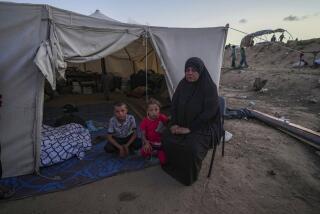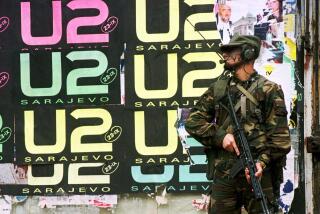EUROPE: FIVE YEARS LATER : Sarajevo, Bosnia-Herzegovina : A Worst-Case Scenario of Rapid Change : Once communism’s success story, the former Yugoslav federation has been devastated by war and ethnic division.
- Share via
SARAJEVO, Bosnia-Herzegovina — The glass-and-steel Unis office towers loom over the city like charred skeletons, their mirrored windows blasted out by artillery shells, the metal frames blackened by fire.
In what were once modern apartment houses hugging the rocky banks of the Miljacka River, artists and professional people pass their days debating politics in salons adorned with pianos and oil paintings but deprived of heat, water and light.
Sarajevo airport, given a face lift for the 1984 Winter Olympics, is now a sandbagged no-man’s-land, straddling a deadly front line between the forces of the Bosnian government and rebel Serb nationalists. The few civilians leaving this besieged city must grope through a secret tunnel dug under the runway.
In the most bitter of post-Communist ironies afflicting Eastern Europe, the people of the former Yugoslav federation who enjoyed the region’s most prosperous lifestyle have been lured in this vaunted age of reform and freedom into the bloodiest conflict to disrupt Europe since World War II.
For the brutalized people of Bosnia-Herzegovina, a comfortable and cultured life has been destroyed and replaced with a daily battle for survival.
Five years after the anti-Communist revolutions that were supposed to have ushered in a new world order, Bosnia--especially this shattered capital--has become a monument to madness and a reminder that even sophisticated societies are not immune to the virus of nationalism.
The violent breakup of Yugoslavia has also shaken the widely held belief that people with food on the table, work to perform and faith in the future can learn to overcome past sufferings and injustice.
Under the stern, paternalistic rule of the late Josip Broz, known throughout his 35-year presidency by his wartime code name of Marshal Tito, the myriad peoples of the Balkan federation came to see themselves as Yugoslavs and to overlook individual national groups’ earlier trespasses against each other.
But even after four decades of peace and prosperity, skillful manipulation by a handful of political zealots persuaded the descendants of those who suffered atrocities during World War II that they should neither forgive nor forget.
“We all had a very good life before this war. There was no reason for it to have happened, except that some backward people who live in the mountains decided they had to avenge history,” says a Sarajevo elementary school principal, Narcis Polimac.
His praise of the Yugoslavia that has been systematically destroyed over the last four years echoes the words of almost every victim of the conflict, with the blame for it subject to ethnic variation.
Many here and in the former Yugoslav republics of Slovenia, Macedonia and Croatia--also now independent states--lay the blame on Serbian President Slobodan Milosevic, who began more than seven years ago to whip up a nationalist psychosis to enhance his own power.
Others, especially Serbs, accuse Croatian extremists of confusing independence with ethnic supremacy and undermining the national reconciliation achieved by Tito.
For Bosnians, caught in the cross-fire of the resurgent Serb-Croat conflict, the horror and devastation visited on their fledgling state is a cruel twist of history that might have been avoided if Tito had lived another decade.
Portraits of the late Yugoslav strongman, who died in 1980, still adorn homes and offices in Bosnia, where the most beleaguered victims of the 2 1/2-year-old war believe that they might have been spared if the partisan hero had survived to pilot his people into the post-Cold War world.
Instead, a decade-long power struggle ensued, with unscrupulous politicians emerging to seize the reins of authority and drive the Yugoslav peoples into war and ruin.
Attacks spurred retaliation. Suffering nurtured resentment. Atrocities sated a thirst for revenge.
Now, after 30 months on the treadmill of violence, both the Serbian nationalists holding the high ground and the hapless civilians trapped in inaptly named “U.N. safe havens” below nurse festering grudges against each other for a war that has dropped their living standard nearly into the Stone Age.
Many blame Western powers as much as they blame nationalists for allowing their country to be overrun while mouthing platitudes about the sanctity of property and borders.
“Our only mistake was believing the outside world would help us when we were attacked,” says Polimac, the principal. “Now we see that we are on our own. We don’t want revenge, but neither will we let those who left us at the Serbs’ mercy give away our land and homes.”
Vows to press on with the fighting that has already claimed 200,000 lives in Bosnia and 10,000 more in an earlier clash in Croatia raise the specter of an endless and expanding war.
The aggression committed in Bosnia and Croatia could also inspire nationalist zealots elsewhere in the ethnic patchwork of Eastern Europe to resort to brute force, taking the land and power they covet and facing little resistance in a passive world.
“There will be other Bosnias,” Prime Minister Haris Silajdzic predicts with resignation. “Unfortunately, this tragedy will happen again and again until the leaders of the world realize they must take risks when the principles of democracy are threatened.”
That the worst-case scenario of rapid historical change unfolded in placid Bosnia took the diplomatic world by surprise, but only because no one was watching.
Yugoslavia, with its open borders, was communism’s success story, if the ideology had one.
Tito, who broke with Moscow in 1948 and charted a unique course of development in Yugoslavia, followed his ideological cohorts in the quest for economic progress through rapid industrialization, throwing up power plants, steelworks and munitions factories in the 1950s and 1960s. While many of the heavy industries were no more successful here than in other command economies, opportunities for family-run businesses and freedom to travel opened up horizons that were unique in the Communist world.
Tourists flowed in for bargain beach vacations along the stunning Adriatic seacoast, often wandering up Bosnia’s majestic Neretva River valley to take in its succession of scenic jewels from medieval Orthodox monasteries to the Ottoman-era marble bridge at Mostar, all since destroyed.
More important, Yugoslavs could go abroad themselves, and millions did. Young men keen on building up the family homestead worked for hard-currency wages in Western Europe, sending their earnings back home where they were to be plowed into sprawling houses or used to start hotels and restaurants.
The remissions maintained a prosperity that enhanced Tito’s drive to stamp out the virulent nationalism that separated Yugoslav peoples during World War II. But in his advancing years, the flagging industrial output that afflicted much of the Communist world in the 1970s prompted Tito to borrow heavily from banks and governments in the West, mortgaging the economic future of the federation. By the time of his death in 1980, Yugoslavia was already suffering the ravages of inflation.
As the years progressed and no successor emerged who was as committed as Tito to a strong federation, the complex leadership formula he had devised to keep each ethnic group’s power in check began to unravel at the hands of self-interested nationalists.
Milosevic rose to become head of the Serbian republic’s Communist Party in 1987 on a campaign to reassert Serbian supremacy over the ethnic Albanian majority in Kosovo province. He then maneuvered nationalist allies into positions in the federal structure until he reached the point where he could dismantle it from within.
As the Serbian nationalists who controlled the collective purse strings funneled up to 70% of the federal budget to preparations for war, secessionist movements took hold in Slovenia, where the most affluent Yugoslavs feared economic disaster, and in Croatia, where nationalist sentiments flared to meet the Serbian challenge from Belgrade.
The war in Bosnia has been a battle for territorial superiority between small groups of aggressive Serbs and Croats in the rival countries that flank this republic. But that the blame for their suffering probably lies elsewhere is no comfort for the victims of the most dramatic historical change in the last half a century.
More to Read
Sign up for Essential California
The most important California stories and recommendations in your inbox every morning.
You may occasionally receive promotional content from the Los Angeles Times.














